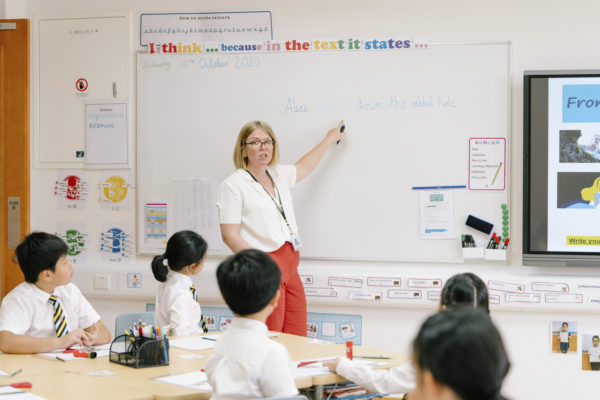

Catherine Donnelly Upper Primary English coordinator It is with great excitement, that I embark on my new position as Upper Primary English Co-ordinator this academic year. I have a wealth of experience teaching all ages in primary school in the UK. I have also held leadership positions, such as Head of English and Upper Primary Unit Leader. However, I have not always been a teacher as I made this decision later in my career. I started working in the finance industry, holding a leadership position in a large multi-national bank. This career choice afforded me a high living standard, but the work was not fulfilling. I wanted to contribute more widely to society and have a greater positive impact on those around me. I returned to school to re-train as a teacher, a decision I have never regretted.

I want to instil in our pupils at Huili this same passion for learning. Education is not just about passing exams, it is also about educating the whole child through a personalised approach and equipping them with the skills to become life-long learners. This will be one of the main focuses in my new role. Assessment to create a personalised learning approach A key principle of successful teaching is to start from where each learner is. This means taking a highly personalised approach to our pupils. We do not simply deliver a prescribed curriculum and expect all pupils to learn in the same way and at the same pace. Rather, teachers should intuitively adapt instruction to best suit whomever they are teaching. Therefore, one of my key objectives this year is to introduce a robust assessment approach to teaching English.

What does assessment for learning look like at Huili? It is a constant work in progress that happens every day in every lesson. 01 Formative assessment Our English teachers gather evidence of our pupils' progress through observation and conversation. We analyse their work and also consider their own assessment of their work. We prepare and administer common formative assessment tasks towards the end of learning units so evidence of pupil learning can be moderated across classes. 02 Summative assessment In addition to assessing for learning, grade level teachers will occasionally apply summative assessment strategies. Often referred to in educational circles as ‘assessment of learning’, this approach helps us summarise and verify pupil achievement at any given moment.

03 Evaluation Evaluation is another important component of assessment. Without it, the information we compile is meaningless. During the evaluation stage, teachers draw conclusions about how pupils are progressing. They also evaluate their own teaching strategies and consider what approaches they should take next. Evaluation is particularly powerful as collaborative effort. Our teachers’ collective knowledge and experience help us determine which teaching strategies are most effective. Moderation helps us identify which students require additional instruction to meet their learning targets and which students require more challenging learning opportunities. It also enables teachers to cross-reference their professional judgement with that of their teammates and with national exemplars of pupil work. We set aside time for our English teachers to jointly evaluate pupil learning, but most evaluation takes place in real time. Teachers respond intuitively to what they observe while they teach. This method is immediately responsive and adaptive. 04 Other assessment methods We can also collect valuable data about our pupils' literacy development from a variety of classroom events. Among them are shared, modelled and guided literacy sessions, retellings, drama, poetry, readers’ theatre, reading response activities and library visits. Every learning experience can reveal insights into our pupils' English capabilities. Our teachers know what to record, when, why and how. We then engage in rigorous professional dialogue, examining evidence of pupil learning, cross-referencing it with external exemplars and what we learn from each other.

Assessment to inform a personalised approach Literacy assessment enables us to plan lessons that meet the needs of every pupil. This means ensuring that each pupil is appropriately challenged and none is leftbehind. It also enables us to provide our pupils with targeted feedback, so they can take responsibility for their education. Teaching is a constant work in progress. We endlessly reflect on the work we do and how we can adapt it to meet our pupils' needs.

Every curriculum and teaching decision we make is driven by our commitment to better understand how we can help our pupils' progress.